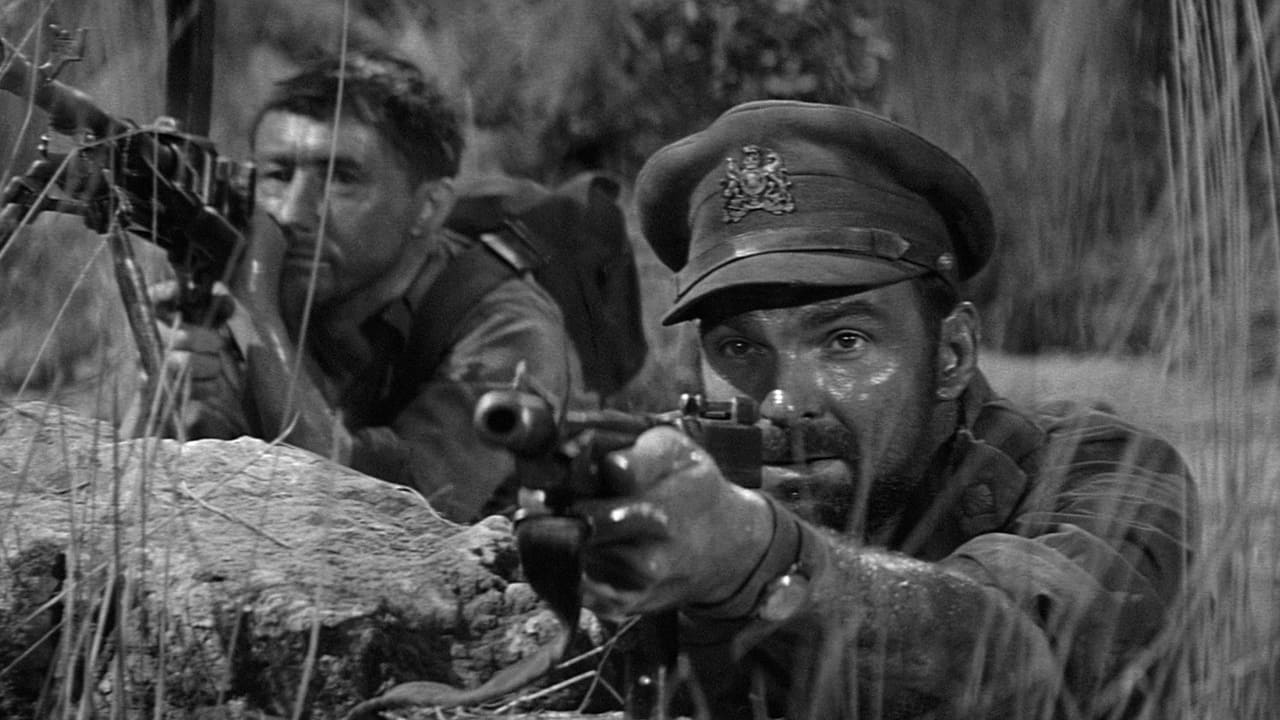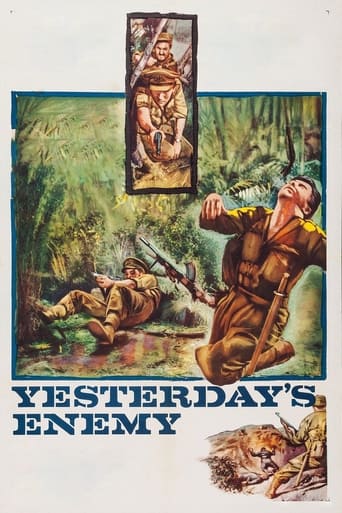Nonureva
Really Surprised!
Comwayon
A Disappointing Continuation
Nicole
I enjoyed watching this film and would recommend other to give it a try , (as I am) but this movie, although enjoyable to watch due to the better than average acting fails to add anything new to its storyline that is all too familiar to these types of movies.
Isbel
A terrific literary drama and character piece that shows how the process of creating art can be seen differently by those doing it and those looking at it from the outside.
Leofwine_draca
YESTERDAY'S ENEMY is a gruff, nihilistic WW2 picture from Hammer Films, directed by the ubiquitous Val Guest and actually one of his best movies. It's a low budget, set-bound production set in the sweaty jungles, where a small squad of British soldiers face off against unknown numbers of Japanese troops. Much of the action is limited to a small ethnic village where the hard-edged Stanley Baker and his men hole up to take stock of their situation. Hammer shot a variety of war pictures throughout the 1950s but this is one of their most interesting: it has no sentimentality whatsoever, instead painting a picture of hard men pushed to increasingly harder and desperate actions. Don't expect action or exciting music or thrills and spills: this is as dark as it gets, with no forgiveness, just death and destruction. An excellent ensemble cast prove up to the material, and what follows is a thoroughly satisfying anti-war picture.
Theo Robertson
On the surface this is just another war film set in the Far East involving the Occidental fighting the Oriental . The fact that it was produced by Hammer Films probably isn't a great omen either but before watching I came on to the trivia of this site to find to Stanley Baker regarded it as one of his best films . It also has the distinction of being written by Peter R Newman who wrote the 1964 DOCTOR WHO story The Sensorites who also wrote YESTERDAY'S ENEMY originally as a television play for the BBC . This film , the teleplay and his contribution for DOCTOR WHO are his only writing credits . He gave up his career as a writer and worked as a hotel porter till his death in an accident in 1975 This is a slightly different take on the war is hell theme . Baker plays Captain Langford who is leading a patrol of men cut off behind Japanese lines in the Burmese jungle . What becomes very clear long before the halfway point in the movie is that things aren't going to work out nicely for Langford's section . This is a bit more than simple heroic brave white soldiers overcoming the Japs and surviving towards a happy ending What sets it apart from its peers in the 1950s war genre is how it blurs the lines between good and bad . Of course since 1959 when this film was released we have seen a glut of films such as APOCALYPSE NOW and PLATOON where the morality of carrying out certain acts in war are heavily questioned as being for the greater good but this would be a relatively new concept in the war genre . What's the difference between native villagers being shot by the British or the Japanese ? Is there one ? What's the difference between killing civilians being shot by soldiers on the ground or by pilots up the sky ? Is there one ? It's left to the audience to answer these questions in their own minds Where the film falls down slightly is when Langford and his surviving men become prisoners of the Japanese . It's a little bit too convenient and obvious that the events seen in the latter half of the film perfectly mirror those seen in the earlier half and where the tables are now turned 360 degrees , not enough to ruin the film but the first half where Langford has to take practical steps which may or may not be war crimes in that era is probably better than the second half . As Baker pointed out at the time the lack of budget where it's obvious that it's filmed on a sound stage also gives the movie a slightly cheap feel One last point while watching this film in 2013 that needs pointing out is the background of the Second World War . What would be viewed as murder or breaking the rules of war today were somewhat more flexible back then . Rightly if Langford committed some of the acts in a village in Afghanistan today he would face a charge of murder but probably not so back in 1942 in a Burmese village . That said the whole point of the film wants to put the audience in the combat boots of Langford and this is does admirably
SimonJack
"Yesterday's Enemy" is a gritty film about a small British force in World War II Burma. It is also a film about the horrors of war, including unconventional actions. My high rating of this film is for the excellent acting jobs by all the cast. The quality of the film and its "feel" of a studio set in the jungle scenes detracts somewhat. This is a type of story that should be told. The one criticism I have is that the film seems to condone what takes place. It conveys the message that, while war is hell, sometimes things like this may be necessary. The chaplain and the news correspondent rightly protest the captain's plan to kill two innocent natives as a means to get a suspected collaborator to talk. Why did the captain not shoot the suspect in the arm or leg instead? The threat and proof of personal injury are very convincing to people, and wounds can be treated. But the killing of two innocent villagers appears nothing more than mindless barbarism. If anything, it would tell the suspect that he needn't worry. His captors don't want to hurt him. So where is his "incentive" to talk? Only after the British shoot the two natives, and the captain says that he is next, does the suspect agree to talk. But had he been shot in the arm or leg, might he not have gotten the message right away? And thereby, the captain would not have killed two innocent men. No doubt, direct and intentional killing of innocent civilians took place in WWII, and in other wars. But there never can be a justifiable reason for such killing. We know of the atrocities of the Japanese against the Chinese people in December, 1937. Some 300,000 people were murdered and tens of thousands raped and brutalized in the rape of Nanking. We know of the inhumane treatment of military and civilians in many Japanese prison camps of WW II. We know of the Nazi holocaust that killed six million Jews; and of the Nazi brutality and killing of many thousands more. Hitler intended to kill civilians when he bombed London as a way to defeat Britain. We know of the Soviet massacre of 22,000 Polish prisoners – mostly civilians – in the Katyn Forest in April, 1940. In the past century, there were other horrors of war against the unarmed. Most people over 55 will remember the My Lai Massacre of March 16, 1968. U.S. soldiers slaughtered 350 to 500 innocent women, children, babies and elderly in one village in South Vietnam. During World War II, Allied bombers killed many civilians when they hit industrial plants and war supply targets. Navy ship guns surely killed civilians when they pounded islands in the Pacific. While such killing is part of the horrors of war, it often cannot be avoided and is not carried out for the sake of killing the innocent. The U.S. dropped atomic bombs on Hiroshima and Nagasaki to end WW II, but we will never forget the horrors of the hundreds of thousands of innocent people killed or injured for life. Many veterans suffer trauma from their experiences in war, most often from the killing of other people, whether directly or inadvertently (as in bombing or shelling enemy sites). In a cause of justice that is foisted upon men in war, there is a big difference between direct killing of enemy combatants and all other killing and treatment. The mark of civilization is the humane treatment of civilians, prisoners, the wounded and defeated. It is never right directly and intentionally to kill innocent civilians, or to mistreat or kill prisoners of war. That is the difference between civilized and uncivilized people. To the extent that countries and armies have carried out such atrocities as these and others, we show that we are uncivilized. To the extent that we abhor such actions and strive to live with civility toward others, we may yet save our humanity. It is only by civility that mankind is able to survive and coexist in the world.
st-shot
Yesterday's Enemy is a taut claustrophobic war film about a whittled down company of British soldiers caught behind the lines in Burma. It takes no sides other than to point out the absurd futility and dehumanization of individuals in war and the limited options they are faced with. It is a sober unromantic and highly provocative work that foreshadows the quagmire in Viet Nam and unapologetically addresses actions taken in the heat of battle far from the sideline moralizing out of harm's way. Captain Langford leads his lost patrol with a firm hand cajoling and threatening members of the unit to remain disciplined and vigilant. When they stumble upon an austere Burmese jungle village they are surprised by a fierce Japanese resistance attempting to protect a senior officer. With the village under control Langford seeks answers through intimidation, torture and finally execution of innocent locals. Eventually they are overwhelmed by the Japanese who adopt the same methods to get answers about their missing general.Despite it's sound stage jungle locale Yesterday's Enemy director Val Guest attains a very atmospheric feel of heat and pressure with the uncompromising downward thrust of the film as reality trumps morality. Stanley Baker's Langford and Gordon Jackson's Sgt. McKenzie remain stoically impressive throughout as they address the reality they are given while Guy Rolfe's Padre and Leo McKern's journalist Max ably bring balance and debate to the picture in arguing the other side.Yesterday's Enemy (even the title points out the absurdity of war) unromantic and dark vision offers no solutions but raises dozens of questions about the ugliness of war without flinching remaining with you long after the firing has ceased. It is Britain's Steel Helmet.

